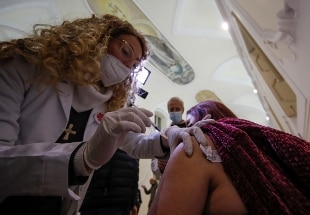Israeli study on Pfizer vaccine: "Third dose improves protection against omicron variant"
Omicron soon dominant in the UK.
France accelerates on vaccines, USA: limit travel
Omicron variant: 3 cases detected by Spallanzani, two women and a man isolated
Omicron, London evaluates plan B: Green pass and teleworking
Share
09 December 2021 The health authorities of the entire planet continue to observe with the utmost attention the spread of the Omicron variant in the five continents while the pandemic today records a total of almost 268 million infections (of which almost 16 in the last 28 days) of which 5,279,358 proved to be lethal. In the last 28 days, according to data from the Johns Hopkins University database, the victims of Covid globally have been 205,532, chilling confirmation that, despite the almost 8 billion and 300 million doses of vaccine administered, the disease still hits hard. . Currently, the WHO has announced, the new strain discovered in South Africa is reported in 57 countries and there are 337 confirmed cases in Europe. The Higher Institute of Health of our country confirms 13,while the sequencing of four other suspected infections is in progress.
Meanwhile, the authoritative Russian virologist Alexander Semyonov, director of the Research Institute on Viral Infections in Ekaterinburg, interviewed by Izvestia, has released the results of a study in which it is shown that Omicron can cause pneumonia 2-3 times faster than previously known coronavirus strains. "What's not good about the Omicron strain is that, just like Delta, it has more tropism, which means it is able to interact with the alveolar epithelium of the lungs, the lower respiratory tract. That's why Omicron descends into the lungs faster. , causing pneumonia. This is very alarming. With the 'old' coronavirus infection, an individual had up to 10-11 days from the time of infection to the development of pneumonia. "
The good news, however, is that, according to Semyonov, the spread of the strain will not have a major impact on the effectiveness of vaccines. "It is possible that it is slightly lower, but not critically. There are no precise data yet, only preliminary. According to some data, the effectiveness decreases, but not more than 40%. According to other data, it decreases even less." . This is an indication that was also given yesterday by WHO through its emergency manager, Michael Ryan, according to which "There are no indications that the current vaccines protect against Omicron". Furthermore, "there is no indication even that this variant causes more severe forms of Covid-19". For his part, WHO Director-General Tedros Adhanom Ghebreyesus said that,According to preliminary data, Omicron is more contagious than Delta even against those who have already contracted the virus or those who are vaccinated, but it could also cause "much milder" diseases.

